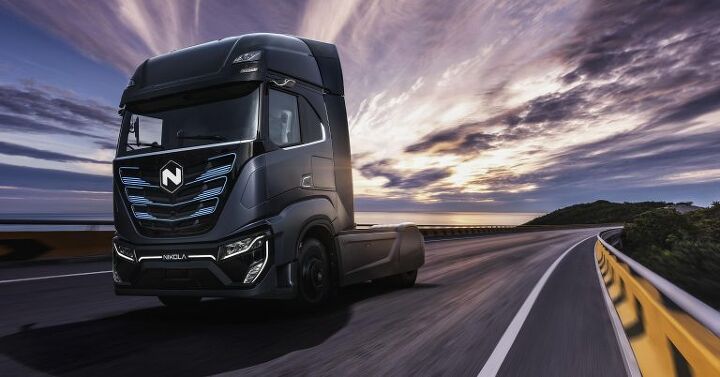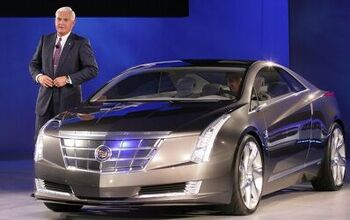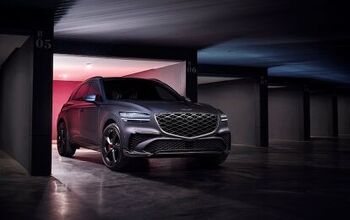GM Investing $2 Billion Into EV Startup Nikola

General Motors announced it will be taking an 11-percent stake in Nikola on Tuesday. It even said it would be actively helping the startup produce the hydrogen/battery-powered Badger pickup, sending the firm’s already-insane share price through the roof. Nikola shares were up 30 percent before the trading day even began, with the General seeing some positive changes in its own stock. Things only improved from there for both companies as news of the partnership continued to spread.
The deal is costing GM $2 billion and allots it one board member of its choosing in exchange for its manufacturing expertise.
Nikola founder and Executive Chairman Trevor Milton praised Detroit’s involvement. While tapping into GM’s manufacturing capabilities (and parts bin) will be a blessing for a company that’s vying to sell a physical product, Milton also noted that the EV startup will soon have direct access to GM’s hydrogen and Ultium battery technologies — both of which required billions in development funding to get where they are today.
“GM was very unique to us because they brought a lot more than just building the Badger,” Milton said. “It’s a perfect relationship. They’re one of the best purchasers, manufacturers, engineering houses in the entire planet.”
Since Nikola is currently more of a conceptual company than an established automaker, this really seems to work in its favor. It’s essentially lopping a fortune off its initial product development costs by bringing on a partner that’s already done the work. Meanwhile, GM gets a nice boost to its share price in an era where electric-vehicle startups seem to be wooing investors to a point that’s becoming downright ridiculous. We’ve not seen anything like this since suburban moms went ham on Beanie Babies in the 1990s.
From CNBC:
Analysts at Cowen said the deal is bigger than they anticipated an will allow Nikola to “leverage GM’s buying power for batteries and internal capabilities within fuel cells.”
“Additionally, the partnership represents a high-volume commercialization of GM’s Hydrotec fuel cells, which we believe is a positive leading indicator of continued adoption of fuel cell technology within heavy-duty transportation,” they wrote in a research note Tuesday.
Nikola began trading June 4 after a reverse merger with VectoIQ, which is a publicly traded special purpose acquisition company headed by former vice chairman of GM Stephen Girsky. The stock has taken off since its IPO despite the fact that Nikola, which was founded in 2015, doesn’t expect to generate revenue until 2021, and it shows the faith investors have in companies that promise vehicles of the future.
While there are loads of unanswered questions about how to make freight-focused EVs work without having to spend the entirety of their mass on energy storage, Nikola feels it is ready to lead the charge with a class-8 truck that’s totally reliant upon electricity next year. That model is supposed to be supported by other electric semis and their hydrogen-powered brethren by 2023.
Meanwhile, the Badger pickup is supposed to arrive in 2022. While the timing seems to suggest it could be assembled alongside the (Detroit) Hamtramck-based Hummer EV, we’ll have to wait for the companies to provide some sort of confirmation. For now, they’re only interested in praising the new partnership and getting investors hyped up.
[Image: Nikola]

A staunch consumer advocate tracking industry trends and regulation. Before joining TTAC, Matt spent a decade working for marketing and research firms based in NYC. Clients included several of the world’s largest automakers, global tire brands, and aftermarket part suppliers. Dissatisfied with the corporate world and resentful of having to wear suits everyday, he pivoted to writing about cars. Since then, that man has become an ardent supporter of the right-to-repair movement, been interviewed on the auto industry by national radio broadcasts, driven more rental cars than anyone ever should, participated in amateur rallying events, and received the requisite minimum training as sanctioned by the SCCA. Handy with a wrench, Matt grew up surrounded by Detroit auto workers and managed to get a pizza delivery job before he was legally eligible. He later found himself driving box trucks through Manhattan, guaranteeing future sympathy for actual truckers. He continues to conduct research pertaining to the automotive sector as an independent contractor and has since moved back to his native Michigan, closer to where the cars are born. A contrarian, Matt claims to prefer understeer — stating that front and all-wheel drive vehicles cater best to his driving style.
More by Matt Posky
Latest Car Reviews
Read moreLatest Product Reviews
Read moreRecent Comments
- Jalop1991 In a manner similar to PHEV being the correct answer, I declare RPVs to be the correct answer here.We're doing it with certain aircraft; why not with cars on the ground, using hardware and tools like Telsa's "FSD" or GM's "SuperCruise" as the base?Take the local Uber driver out of the car, and put him in a professional centralized environment from where he drives me around. The system and the individual car can have awareness as well as gates, but he's responsible for the driving.Put the tech into my car, and let me buy it as needed. I need someone else to drive me home; hit the button and voila, I've hired a driver for the moment. I don't want to drive 11 hours to my vacation spot; hire the remote pilot for that. When I get there, I have my car and he's still at his normal location, piloting cars for other people.The system would allow for driver rest period, like what's required for truckers, so I might end up with multiple people driving me to the coast. I don't care. And they don't have to be physically with me, therefore they can be way cheaper.Charge taxi-type per-mile rates. For long drives, offer per-trip rates. Offer subscriptions, including miles/hours. Whatever.(And for grins, dress the remote pilots all as Johnnie.)Start this out with big rigs. Take the trucker away from the long haul driving, and let him be there for emergencies and the short haul parts of the trip.And in a manner similar to PHEVs being discredited, I fully expect to be razzed for this brilliant idea (not unlike how Alan Kay wasn't recognized until many many years later for his Dynabook vision).
- B-BodyBuick84 Not afraid of AV's as I highly doubt they will ever be %100 viable for our roads. Stop-and-go downtown city or rush hour highway traffic? I can see that, but otherwise there's simply too many variables. Bad weather conditions, faded road lines or markings, reflective surfaces with glare, etc. There's also the issue of cultural norms. About a decade ago there was actually an online test called 'The Morality Machine' one could do online where you were in control of an AV and choose what action to take when a crash was inevitable. I think something like 2.5 million people across the world participated? For example, do you hit and most likely kill the elderly couple strolling across the crosswalk or crash the vehicle into a cement barrier and almost certainly cause the death of the vehicle occupants? What if it's a parent and child? In N. America 98% of people choose to hit the elderly couple and save themselves while in Asia, the exact opposite happened where 98% choose to hit the parent and child. Why? Cultural differences. Asia puts a lot of emphasis on respecting their elderly while N. America has a culture of 'save/ protect the children'. Are these AV's going to respect that culture? Is a VW Jetta or Buick Envision AV going to have different programming depending on whether it's sold in Canada or Taiwan? how's that going to effect legislation and legal battles when a crash inevitibly does happen? These are the true barriers to mass AV adoption, and in the 10 years since that test came out, there has been zero answers or progress on this matter. So no, I'm not afraid of AV's simply because with the exception of a few specific situations, most avenues are going to prove to be a dead-end for automakers.
- Mike Bradley Autonomous cars were developed in Silicon Valley. For new products there, the standard business plan is to put a barely-functioning product on the market right away and wait for the early-adopter customers to find the flaws. That's exactly what's happened. Detroit's plan is pretty much the opposite, but Detroit isn't developing this product. That's why dealers, for instance, haven't been trained in the cars.
- Dartman https://apnews.com/article/artificial-intelligence-fighter-jets-air-force-6a1100c96a73ca9b7f41cbd6a2753fdaAutonomous/Ai is here now. The question is implementation and acceptance.
- FreedMike If Dodge were smart - and I don't think they are - they'd spend their money refreshing and reworking the Durango (which I think is entering model year 3,221), versus going down the same "stuff 'em full of motor and give 'em cool new paint options" path. That's the approach they used with the Charger and Challenger, and both those models are dead. The Durango is still a strong product in a strong market; why not keep it fresher?



































Comments
Join the conversation
Here's a WSJ write-up (hit the little X in the top right corner of the "Continue reading" box and you should be able to read it): https://tinyurl.com/yxj46jxx Nikola to GM (paraphrasing): 'You're one of the best purchasers, manufacturers, engineering houses in the entire planet. Can you help us bring our new product to market as quickly and smoothly as you launched the new mid-engine Corvette?' GM to Nikola (paraphrasing): 'Yes we can.' [Still pondering this announcement. But first reaction is, GM has all this amazing future-tech (we are told), and "engineering and manufacturing expertise" which they bring "to the table" but strangely, never to the showroom floor. GM gets the bump from the announcement and can now slow-walk a potential competitor (easier to sabotage Nikola when you have a board seat at Nikola).]
This story is a little paraphrased. Nikola gave GM 11% (current value 2 billion)of their company and a seat on Nikola's board. Not the other way around as stated in the article. This is not a liability on GM's balance sheet it's income for providing tech and building vehicles.